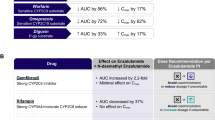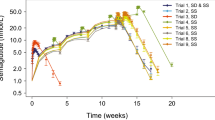Abstract
The usefulness of substituting dextromethorphan for debrisoquin as a probe for cytochrome P450IID6 deficiency was investigated in 20 male cancer patients. Each patient was studied on two occasions. An oral dose of dextromethorphan (60 mg) was administered to 13 patients and are week later an oral dose of debrisoquin (10 mg) was administered to each patient. The order was reversed for the other 7 patients. An 8-h urine sample was collected after administration of each test drug and assayed for parent drug and metabolites. Five poor metabolizers (PMs) and 15 extensive metabolizers (EMs) of debrisoquin were tested. The debrisoquin metabolic ratio (DMR), calculated as [parent drug]/[metabolite], correlated with the metabolic ratio of dextromethorphan (R 2=0.58,P=0.0001). All PMs of debrisoquin (metabolic ratio >12.0) were easily identified as being PMs of dextromethorphan (metabolic ratio >0.30). Within the EM group, there was a significant correlation between the metabolic ratios of debrisoquin and dextromethorphan (R 2=0.82, P<0.0001). There was not as clear a correlation in the PM group (R 2=0.32, P=0.32). These findings suggest that dextromethorphan can be substituted for debrisoquin in establishing the debrisoquin phenotype in a patient population with metastatic cancer.
Similar content being viewed by others
References
Alvan G (1991) Clinical consequences of polymorphic drug oxidation. Fundam Clin Pharmacol 5: 209
Ayesh R, Idle JR, Ritchie JC, Crothers MJ, Hetzel MR (1984) Metabolic oxidation phenotypes as markers for susceptibility to lung cancer. Nature 312: 169
Balant L, Gundert-Remy U, Boobis A, von Bahr C (1989) Relevance of genetic polymorphism in drug metabolism in the development of new drugs. Eur J Clin Pharmacol 36: 551
Benitez J, Ladero JM, Fernandez-Gundin MJ, Llerena A, Cobaleda J, Martinez C, Munoz JJ, Vargas E, Prados J, Gonzalez-Rozas F, et al (1990) Polymorphic oxidation of debrisoquine in bladder cancer. Ann Med 22: 157
Brosen K, Gram LF (1989) Clinical significance of the sparteine/debrisoquin oxidation polymorphism. Eur J Clin Pharmacol 36: 537
Brosen K, Zeugin T, Meyer U (1991) Role of P-450IID6, the target of the sparteine-debrisoquin oxidation polymorphism, in the metabolism of imipramine. Clin Pharmacol Ther 49: 609
Caporaso N, Shaw G (1991) Clinical implications of the competitive inhibition of the debrisoquin-metabolizing isozyme by quinidine. Arch Intern Med 151: 1985
Caporaso NE, Hayes RB, Dosemeci M, et al (1989) Lung caner risk, occupational exposure, and the debrisoquine metabolic phenotype. Cancer Res 49: 3675
Caporaso NE, Tucker MA, Hoover NA, Hayes RB, Pickle LW, Issaq HJ, Muschik GM, Green-Gallo L, Buivys D, Aisner S, et al (1990) Lung cancer and the debrisoquine metabolic phenotype. J Nall Cancer Inst 82: 126
Colton T (1974) Statistics in medicine. Little, Brown & Company. Boston, p211.
Eichelbaum M, Spannbrucker N, Steinche B, Dengler HJ (1979) Defective N-oxidation of sparteine in man; a new pharmacogenetic defect. Eur J Clin Pharmacol 16: 183
Evans DA, Mahgoub A, Sloan TP, Idle JR, Smith RL (1980) A family and population study of the genetic polymorphism of debrisoquine oxidation in a white British population. J Med Genet 17: 102
Funck-Brentano C, Thomas G, Jacqz-Aigrain E, Poirier JM, Simon T, Bereziat G, Jaillon P (1992) Polymorphism of dextromethorphan metabolism: relationship between phenotype, genotype and response to the administration of encainide in humans. J Pharmacol Ex Ther 263: 780–786
Gaedigk A, Blum M, Gaedigk R, Eichelbaum M, Meyer U (1991) Deletion of the entire cytochrome P450 CYPIID6 gene as a cause of impaired drug metabolism in poor metabolizers of the debrisoquine/sparteine polymorphism. Am J Hum Genet 48: 943
Guengerich FP (1988) Roles of cytochrome P-450 enzymes in chemical carcinogenesis and cancer chemotherapy. Cancer Res 48: 2946
Guttendorf RJ, Wedlund PJ, Blake J, Chang SL (1988) Simplified phenotyping with dextromethorphan by thin-layer chromatography: application to clinical laboratory screening for deficiencies in oxidative drug metabolism. Ther Drug Monit 10: 490
Hildebrand M, Seifert W, Reichenberger A (1989) Determination of dextromethorphan metabolizer phenotype in healthy volunteers. Eur J Clin Pharmacol 36: 315
Idle JR, Mahgoub A, Angelo MM, Dring LG, Lancaster R, Smith RL (1979) The metabolism of (14C) debrisoquine in man. Br J Clin Pharmacol 7: 257
Jacqz E, Hall S, Branch R (1986) Genetically determined polymorphisms in drug oxidation. Hepatology 6: 1020
Knodell R, Browne D, Gwozdz G, Brian W, Guengerich F (1991) Differential inhibition of individual human liver cytochromes P-450 by cimetidine. Gastroenterology 101: 1680
Kupfer A, Schmid B, Preisig R, Pfaff G (1984) Dextromethorphan as a safe probe for debrisoquine hydroxylation polymorphism. Lancet 2: 517
Ladero J, Benitez J, Jara C, et al (1991) Polymorphic oxidation of debrisoquine in women with breast cancer. Oncology 48: 107
Mahgoub A, Idle JR, Dring LG, Lancaster R, Smith RL (1977) Polymorphic hydroxylation of debrisoquine in man. Lancet 1: 584
Nebert D (1991) Role of genetics and drug metabolism in human cancer risk. Mutat Res 247: 267
Schellens J, Ghabrial H, van der Wart H, Bakker E, Wilkinson G, Breimer D (1991) Differential effects of quinidine on the disposition of nifedipine, sparteine, and mephenytoin in humans. Clin Pharmacol Ther 50: 520
Schmid B, Bircher J, Preisig R, Kupfer A (1985) Polymorphic dextromethorphan metabolism: co-segregation of oxidative O-demethylation with debrisoquin hydroxylation. Clin Pharmacol Ther 38: 618
Steiner E, Iselius L, Alvan G, Lindsten J, Sjoqvist F (1985) A family study of genetic and environmental factors determining polymorphic hydroxylation of debrisoquin. Clin Pharmacol Ther 38: 394
Author information
Authors and Affiliations
Rights and permissions
About this article
Cite this article
Anthony, L.B., Boeve, T.J. & Hande, K.R. Cytochrome P-450IID6 phenotyping in cancer patients: debrisoquin and dextromethorphan as probes. Cancer Chemother. Pharmacol. 36, 125–128 (1995). https://doi.org/10.1007/BF00689196
Received:
Accepted:
Issue Date:
DOI: https://doi.org/10.1007/BF00689196




